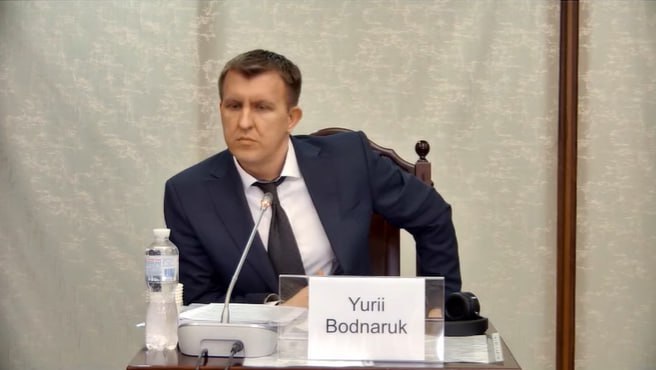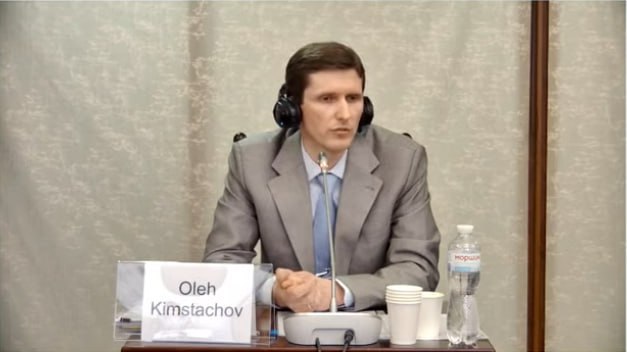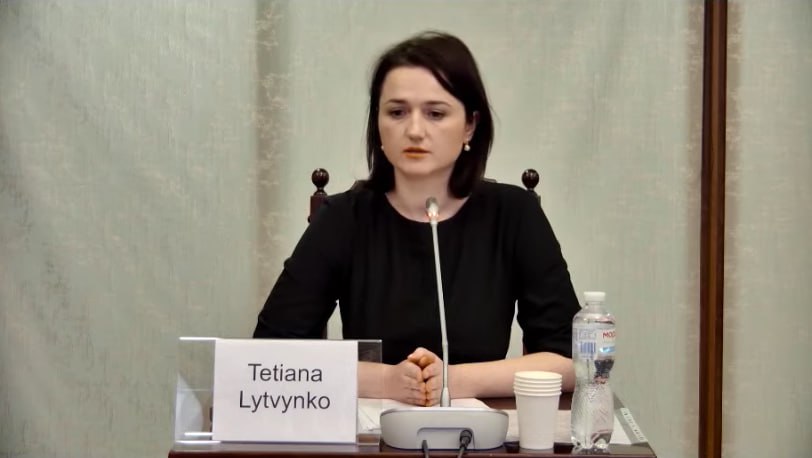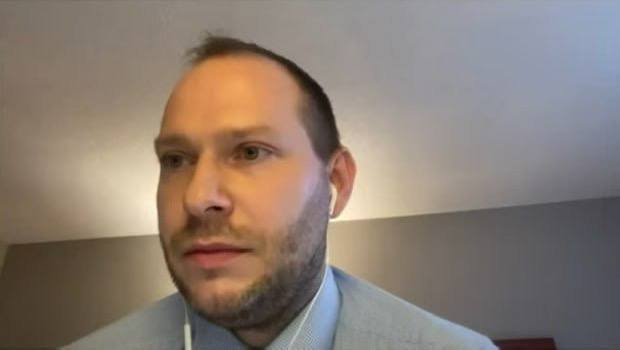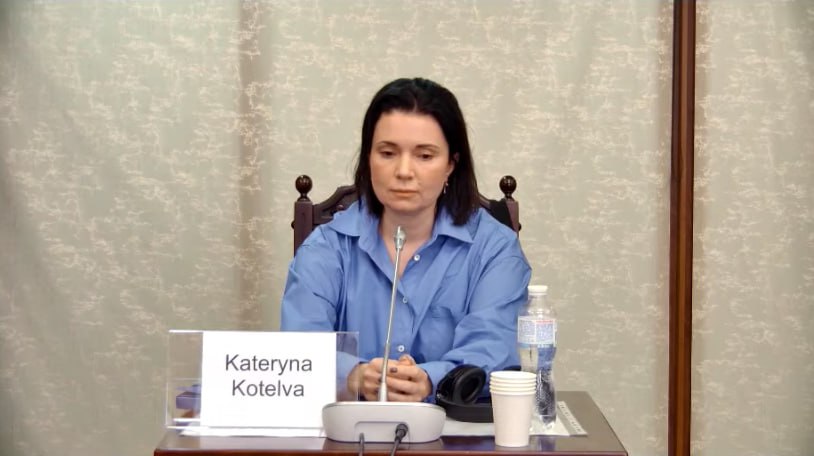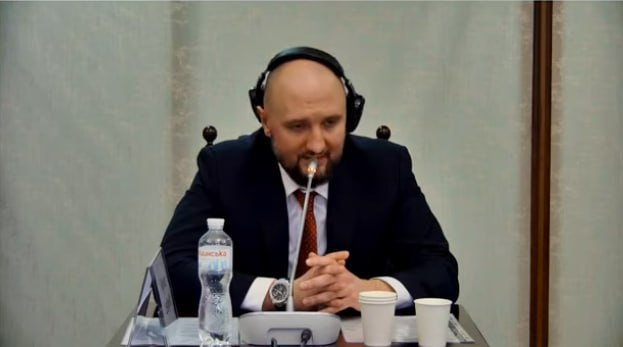

On February 6, the Public Council of International Experts and the High Qualification Commission of Judges began interviews with candidates for the positions of HACC judges.
Only 7 candidates reached this stage:
- Yurii Bodnaruk
- Oleh Kimstachov
- Tetiana Lytvynko
- Mykhailo Odariuk
- Kateryna Kotelva
- Kyrylo Lehkykh
- Olena Chernova.
Earlier, we published the profiles of all competition participants and asked our questions to them. Here are the answers that the candidates provided to the questions from PCIE, HQCJ, and the public during their interviews.
Earlier, we published the profiles of all competition participants and asked our questions to them.
Yurii Bodnaruk
HACC Judicial Assistant
The PCIE inquired about the sources of income Bodnaruk used to purchase an apartment in Odesa in 2020. The candidate clarified that the property, still under construction at the time, was actually acquired in 2016, but ownership was not registered for four years. At the time of purchase, the space was not classified as residential—it was located on the top floor and designated as an “art studio.” Later, Bodnaruk hired lawyers to verify whether the space met the criteria for residential property.
He does not see any ethical concerns regarding this matter, noting that the only issue was the inability to register a place of residence there. In response to a question from an HQCJ member, the candidate stated that he had not looked into the fact that, according to the documents, the apartment on the 14th floor does not officially exist, as the building’s project plan includes only 13 floors, and the municipal land lease agreement permits a maximum of 12 floors. “I know what floor I live on—it’s the 14th. The elevator goes up to the 13th floor, and then you have to walk up one more,” Bodnaruk explained, justifying his lack of awareness.
The PCIE also inquired extensively about the sources of income Bondaruk relied on for living expenses and purchasing valuables, including a car. According to the PCIE, based on his declared expenses over 12 years, the candidate would have had to subsist on just $4.10 per day. Bondaruk responded that he had received substantial financial support from his parents, adding that “other income not recorded in the tax register should also be considered.” Only after 2014 did he begin supporting his parents. In fact, after they returned part of these funds—$30,000—Bodnaruk was able to purchase the aforementioned apartment in Odesa. However, he omitted the $30,000 from his declaration, as he did not consider the funds his own.
The PCIE also inquired how Bodnaruk managed to save UAH 5,000 more than his total earnings for the year in 2019. The candidate explained that the expenses referenced by the council did not accurately reflect his actual spending during that period, as he had spent a significant portion of the funds the following year on car repairs.
Interestingly, during the competition for the position of a member of the HQCJ, it was revealed that Bodnaruk had been recommended for the role of chairman of the territorial election commission in Odesa. However, according to Bodnaruk, he did not know who had made this recommendation. Only after a thorough review of the relevant documents by the HCJ did it come to light that the recommendation had been made by Serhii Kivalov, the president of the Odesa Law Academy.
The PCIE and the HQCJ also inquired about the recommendation for participation in the HACC competition, which Bodnaruk received from his current lawyer, Yurii Sukhov, the founder of S&S Legal Consulting LLC. Interestingly, the candidate had also worked for this company; however, according to his tax returns, he did not pay any taxes during that period. Bodnaruk explained that he was actually paid by another company at that time.
Additionally, the candidate did not see any issue with the fact that lawyer Sukhov had acted as a defender in cases at the HACC AC, where the judge, whom Bodnaruk assisted, presided. When Bodnaruk’s candidate was heard, Sukhov was present in only two such cases, and the defense’s complaints were denied. According to Bodnaruk, Sukhov knows him professionally, and therefore, he considered the recommendation entirely appropriate.
The PCIE also inquired extensively about the sources of income Bondaruk relied on for living expenses and purchasing valuables, including a car. According to the PCIE, based on his declared expenses over 12 years, the candidate would have had to subsist on just $4.10 per day. Bondaruk responded that he had received substantial financial support from his parents, adding that “other income not recorded in the tax register should also be considered.”
Oleh Kimstachov
HACC Judicial Assistant
First and foremost, experts were interested in the situation when Kimstachov resigned from his position as a Judge of the Uman City District Court during his participation in the first HACC competition. Subsequently, a disciplinary case was initiated against him.
Kimstachov assured that he resigned because remaining in his position would prevent him from applying for the HACC competition, although he was confident that his actions were legal. When asked by the Commission whether he would make the same decision as a HACC judge, Kimstachov assured that he would be committed to working in the Anti-Corruption Court for another 10-15 years.
When asked why the Commission should believe that Kimstachov has corrected his previous mistakes at the Uman court, he responded that he has been working as an assistant at the HACC for several years and consistently works overtime, without receiving any complaints from his HACC judge regarding his performance.
The HQCJ members did not overlook the case involving Judge Kimstachov’s consideration of a case involving a current judge from his own court. The candidate admitted the mistake, explaining that he frequently reflects on this case because “it became a lesson for me and an obstacle to my career development during the first HACC competition,” even though, at the time, he believed his actions were correct.
Now about money and assets. The Commission raised questions about a gift of cryptocurrency equivalent to $15,000 that Kimstachov received from his mother in 2023. The tax office’s data revealed that her official income over the last 25 years amounted to only UAH 63,000. Kimstachov explained that the tax authorities did not account for some of his mother’s income, such as her pension, and emphasized that her total income allowed her to save that amount. The candidate also clarified that the crypto assets were not transferred directly from his mother but rather through his brother, to whom she had transferred the money.
Kimstachov reported receiving over UAH 3 million in income between 2019 and 2022, primarily from his work at the HACC. In November 2022, the candidate sold an apartment in Uman for UAH 440,000, citing its unsatisfactory location and living conditions, as well as the onset of the war. A year later, he purchased a new apartment for over UAH 3.5 million, financed through family savings and borrowed funds.
An unfortunate incident occurred in 2023 when scammers, having gained Kimstachov’s trust, stole $15,000 worth of cryptocurrency from his account. This raised concerns within the Commission regarding the candidate’s potential naivety, which could pose a risk in his work for the HACC.
An unfortunate incident occurred in 2023 when scammers, having gained Kimstachov's trust, stole $15,000 worth of cryptocurrency from his account. This raised concerns within the Commission regarding the candidate's potential naivety, which could pose a risk in his work for the HACC.
Tetiana Lytvynko
Judge of the Shostka City District Court of Sumy region
Members of the PCIE noted that Tetiana applied for two positions simultaneously – one for a HACC judge and the other for a judge of the court of appeals. Lytvynko stated that if given the choice between the two competitions, she would prioritize the HACC position, provided she is successful in securing it. In her view, the HACC is the most professional institution in Ukraine, and she recognizes the public’s high level of trust in it, noting that this trust is significantly greater compared to other institutions.
The members of the PCIE were also interested in a complaint that had been filed against Tetiana. Lytvynko stated that she did not understand the reasons behind the complaint and explained that the plaintiff himself had written her letters, expressing that she had handled the complaint well and that he held a positive view of her. She also mentioned that she was unaware of the results of the complaint’s consideration.
The next issue discussed during the interview was Lytvynko’s declarations. From 2015 to 2022, the candidate did not declare a land plot associated with her parents’ house, but the land was declared in 2023. She explained that the land belonged solely to her father and since she had not lived with her parents since 2003, she considered it unnecessary to declare. However, Lytvynko acknowledged that this was a mistake and, starting in 2023, began declaring the land.
Another issue in the declarations was that the apartment in which the candidate lived in Kyiv in 2015 was not reflected. Lytvynko explained that she rented a room in the apartment and did not have any rental documents, which is why she did not declare this property. She also admitted that it was her mistake and could not recall why she made that decision, although she now understands why it was incorrect.
The next question concerned her family’s housing, specifically the purchase of an apartment in Kyiv in November 2015. Tetiana’s mother bought a 45.7 sq.m. apartment for UAH 546,000, despite her parents declaring only $47,000 in total income from 2000 to 2014.
Lytvynko explained that the property was purchased during the construction phase, and the funds for the purchase were provided by her mother, who worked as a teacher and headmaster at a school. Additionally, her parents were involved in raising livestock and cultivating crops on land shares transferred to the family. However, she cannot provide any evidence of their earnings, as for a period, these activities were not taxed, and the income was calculated without formal documentation. Currently, tenants reside in the apartment, and Tetiana neither holds ownership rights nor receives any income from it.
A crucial question for the candidate was her qualification for the position of a HACC judge. Members of the HQCJ posed several professional tasks that a HACC judge should be capable of addressing. However, the candidate’s responses were not always accurate. For instance, she mistakenly believed that the pre-trial investigation term halts only for the defense during familiarization with case materials but not for the prosecution. She even suggested that this misunderstanding warranted the closure of a criminal case involving drugs. When asked about the distinction between an illegal gift under the Administrative Code and a gift as an illegal benefit, Tetiana Lytvynko was unable to provide a clear answer.
When asked what she would do if she hypothetically faced pressure as a HACC judge, Lytvynko replied, “I can’t even imagine it.” She emphasized that neither financial nor any other issues should influence her decisions.
A crucial question for the candidate was her qualification for the position of a HACC judge. Members of the HQCJ posed several professional tasks that a HACC judge should be capable of addressing. However, the candidate's responses were not always accurate. For instance, she mistakenly believed that the pre-trial investigation term halts only for the defense during familiarization with case materials but not for the prosecution.
Mykhailo Odariuk
Deputy Chairman of the Irpin City Court, Kyiv region
The candidate joined the online interview from the United States, where he is participating in an event organized by USAID. Permission to cross the border was granted to him by the court chairman through an official order.
From 2013 to 2019, Odariuk worked at the Izium court while living in Kharkiv. The round trip took him from 3 to 6 hours daily, prompting the members of the PCIE to ask in detail about his commuting and work schedule. Odariuk explained that he traveled to Izium using various means of transport, including the BlaBlaCar service, electric trains, his wife’s car, and carpooling with colleagues while maintaining a full-time work schedule at the court.
Regarding monetary and property issues — since 2010, the candidate has become the owner of an apartment in Kharkiv for UAH 71,000 most of the money was provided by his mother. In 2019, he received UAH 480,000 in cash from his brother. Earlier, Odariuk’s parents gave nearly $150,000 for him to make deposits, with the intention that he would receive income from the interest.
After the invasion began, Odariuk moved to work at the Irpin court, even though the cases from Izium had been transferred to Pavlohrad. The candidate applied to the Supreme Court, requesting to be reassigned to Kyiv or Kharkiv, citing the danger to his family in Pavlohrad due to its proximity to the Donetsk region and ongoing shelling. The Commission, however, expressed doubts about the candidate’s sincerity in this request.
The HQCJ was also interested in a case in which Odariuk ruled on a dispute involving the State Agency of Ukraine for Land Reclamation, Fisheries, and Food Programs, which had terminated its contract with the director of a private company. Odariuk issued a ruling suspending the dismissal order, despite the Supreme Court’s established practice prohibiting such measures. Moreover, the case contained jurisdictional errors. During the interview, Odariuk acknowledged these mistakes.
Members of the HQCJ also asked about a criminal case where the candidate seized a crop just before it was ready for harvesting. Odariuk replied that the harvest was considered material evidence, and the ruling permitted the investigator to harvest the crop in the presence of a state bailiff.
In addition to judicial violations, the Commission sought to clarify the candidate’s traffic violations. The court of first instance initially found him not guilty, but the court of appeal overturned this decision after video evidence confirmed he had run a red light. During the interview, Odariuk admitted the violation, explaining that he had been distracted by children in the car.
Finally, PCIE members questioned Odariuk about plagiarism in his dissertation, as several pages were identical to other works. The candidate explained that much of the text contained legislative definitions that could not be altered, so he did not consider it plagiarism.
After the invasion began, Odariuk moved to work at the Irpin court, even though the cases from Izium had been transferred to Pavlohrad. The candidate applied to the Supreme Court, requesting to be reassigned to Kyiv or Kharkiv, citing the danger to his family in Pavlohrad due to its proximity to the Donetsk region and ongoing shelling. The Commission, however, expressed doubts about the candidate's sincerity in this request.
Kateryna Kotelva
Judge of the Halytskyi District Court of Lviv
The PCIE was particularly interested in a 2016 incident. Experts pointed out that a post on Kateryna’s page and media reports described her being physically blocked in court during a hearing involving “nationalist volunteers accused of causing grievous bodily harm,” including to an SSU officer. Kateryna stated that such incidents were not uncommon at the time. She called it a “crime against justice” and highlighted the issue that no one was held accountable and no one came to her defense. In the case itself, Kotelva stated that she delivered a fair sentence, though she admitted changing the defendants’ detention to home arrest under certain pressure.
In this context, experts questioned whether she would be able to work as a HACC judge under potential pressure. Kateryna noted that the secure premises and well-organized work at the HACC were key factors in her decision to apply for the position. She emphasized that, having gone through a traumatic experience, she understands that such pressure does not impact her ability to administer justice.
During the conversation, Kotelva initially changed her mind and was unsure whether the post in question was hers, so she requested the original post. After reviewing it, she clarified that she did not write the post that the experts had referred to, nor was she aware of the media material or involved in coordinating its publication. She only learned about this publication five days prior. However, she later admitted that it was possible she could have written such a post.
Next, the experts inquired about the case in 2017 when Kotelva made a decision without the participation of the person whose rights were involved in the proceedings. Kateryna explained that in that instance, she focused on the substance of the matter and broke the procedural form, failing to find a balance, for which she was suspended by the HCJ. She noted that her primary concern at the time was the protection of property rights.
According to the judge, she would now adhere to the rule of law, stating, “Back then, I didn’t help anyone and created a problem for myself. Proper legal procedure must be followed,” Kateryna admitted.
Kotelva also failed to accurately answer the professional question from a member of the Commission regarding who is responsible for summoning the proper defendant in civil cases.
Further, the HQCJ recalled Kateryna’s 2023 post, where she criticized the blocking of the election of the chairman of the Halytskyi court. They were interested in what prompted Kotelva to bring this story to the public. Kateryna explained that since there was a direct violation of the law, she believed it was necessary to respond to it. Initially, she submitted two complaints to the HCJ, but received no response. As a result, Kotelva decided to use public communication.
After that, property issues were considered. Experts were interested in why she did not list any property in Lviv in her declarations, despite being a judge there. Kotelva explained that during those years she lived in Kyiv, as she was training and teaching at the National School of Judges, so she had no property in Lviv.
The Commission inquired about Kotelva’s trip to Nepal in April 2017. Initially, the judge only mentioned the cost of the tickets—$2,300. However, when the HQCJ asked about additional expenses for the hike, including permits, food, and a guide, she couldn’t recall the exact amount. Kotelva explained that her income at the time allowed for the trip, and part of the funds came from her credit limit.
The PCIE was particularly interested in a 2016 incident. Experts pointed out that a post on Kateryna's page and media reports described her being physically blocked in court during a hearing involving “nationalist volunteers accused of causing grievous bodily harm,” including to an SSU officer. Kateryna
Olena Chernova
Judge of the Zolochiv District Court of the Kharkiv region, now seconded to Irpin City Court of the Kyiv region
The PCIE first inquired about Chernova’s apartment in Kyiv, which she had used for a long time based on an oral agreement. Chernova explained that she had arranged the accommodation with a friend, whose husband owned the apartment. The husband is the director of companies owned by Oleksandr Hlimbovskyi, the father-in-law of the former head of the State Fiscal Service, Nasirov. Additionally, the apartment owner is a witness in the case involving Nasirov and Hlimbovskyi.
The candidate explained that her friend had offered her the apartment, and Chernova moved in at the beginning of the full-scale war. She clarified that she did not have frequent communication with her friend’s husband and was unaware of his involvement in the Nasirov case until the HACC competition.
The PCIE was also interested in the candidate’s trip to Russia in April 2016. According to Chernova, her father was born in the Belgorod region near the border, and his parents lived and are now buried there. Therefore, in 2016, she visited Russia to visit the cemetery where her grandparents are buried. Chernova clarified that she no longer has any relatives in the Russian Federation that she knows of.
They also asked her about her financial situation, as the candidate owns an apartment in Kharkiv, which was purchased for $32,300 by her sister and mother in 2010. The candidate claimed that the money for the purchase came from the sale of another apartment, with an additional $8,800 contributed to the amount. Chernova also mentioned that she helped her family financially through friendly relations.
The PCIE also decided to clarify the nature of the targeted financial assistance amounting to UAH 184,700 and UAH 84,100, as indicated in her declaration. However, due to the sensitivity of the issue, Chernova’s explanation was heard behind closed doors without broadcasting.
After the resumption of the broadcast, the HQCJ asked about the controversial case involving the State Agency of Ukraine for Land Reclamation, Fisheries, and Food Programs, which had been discussed the previous day when the HQCJ questioned candidate Odariuk (Chernova’s colleagues in court). He had been appointed as the judge in this case specifically due to Chernova’s one-day vacation. The candidate replied that it was on that day that she was moving things from Kharkiv. Overall, during her time working at the Irpin City Court, she had taken a vacation five more times.
The Commission also pointed out Chernova’s mistake in the 2018 integrity declaration, where, despite being brought to justice for traffic violations, she did not mention it in the document. Chernova explained that at the time, judges only noted disciplinary violations in the declaration, but it turned out that this approach was incorrect. In future questionnaires, she made sure to mention traffic violations as well.
It also turned out that Chernova received cash payments as an IDP from Kharkiv until March 2024. The Commission inquired why she had received them for such an extended period and whether this contradicted the Code of Judicial Ethics. In response, the candidate explained that she was entitled to receive the payments until she applied to terminate them in early 2024, as she no longer needed the financial support.
The PCIE was also interested in the candidate's trip to Russia in April 2016. According to Chernova, her father was born in the Belgorod region near the border, and his parents lived and are now buried there. Therefore, in 2016, she visited Russia to visit the cemetery where her grandparents are buried.
Kyrylo Lehkykh
Associate Professor of the Department of justice of the Educational and Scientific Institute of Law of Taras Shevchenko Kyiv National University, lawyer
At first, the PCIE tried for quite a while to get a direct answer from Kyrylo about whether he had encountered any form of corruption in his life. The candidate attempted to avoid giving a straightforward answer and eventually acknowledged that there may have been situations in his life.
When asked if he believes corruption exists within the judicial authorities, Lehkykh stated that based on information from NABU-SAPO, he understands that the problem exists. However, he added that an accusation or suspicion can be used as a tool and does not necessarily have a solid basis on its own.
The Commission became interested in a controversial construction project led by Valerii Holovko, who is not only a business partner of Lehkykh’s father but also a current client of Lehkykh. The land, initially owned by the NGO “Ruskii Par,” was not designated for construction, but its purpose was later changed, allowing for the construction of a house.
When asked whether his father’s business ties with Holovko and the latter’s defense in the criminal case would affect his impartiality, Lehkykh said that he does not object to the existence of such a possibility. After that, he asked to hold a closed part of the meeting, due to sensitive information about Holovko.
Holovko is also connected to the case of a Subaru Forester, which Lehkykh became the owner of after his father purchased the car from the same Holovko. In 2020, Lehkykh received more than UAH 2 million from his mother as a gift. The candidate explained that his parents wanted to help him purchase a new car.
The HQCJ was interested in the fact that Kyrylo Lehkykh served on the commission for the competition to select the NABU Director while simultaneously defending the interests of individuals in cases under investigation by the NABU. The candidate assured that he did not see this as a conflict of interest, as well as the NACP. Ultimately, he claimed two recusals during that competition.
It is known that in 2004-2005, Lehkykh worked as a legal adviser at RGS Russian Law Group LLC, and in 2023, he received UAH 109,000 of income from BTF-Koltubing, a company with a Belarusian connection in its ownership. Lehkykh explained that he was not involved in naming the first organization, and his work there did not reflect his political views. As for the second company, he stated that it is Ukrainian and has its own office, but due to legal restrictions, it cannot sever ties with its Belarusian owner.
Earlier, the candidate had spoken out against excessively high bail amounts. When the Commission asked him about this again, Lehkykh replied that, as a judge, he would be guided by the principle of balance and focus on the practice of the ECHR. He added that bail should not be exorbitantly large, as HACC judges often set such high amounts that they effectively result in custody without alternative.
In the end, the members of the Commission, noticing the pro-lawyer approach in the candidate’s answers, asked if Lehkykh planned to make a “cooling-off period” between his work as a defender and his potential judicial career. The law sets a time limit for former law enforcement officers but does not impose such restrictions on lawyers participating in competitions. Lehkykh responded that his practical activities would not interfere with his transition to the judicial profession, and he would only need to adapt.
The HQCJ was interested in the fact that Kyrylo Lehkykh served on the commission for the competition to select the NABU Director while simultaneously defending the interests of individuals in cases under investigation by the NABU. The candidate assured that he did not see this as a conflict of interest, as well as the NACP. Ultimately, he claimed two recusals during that competition.




